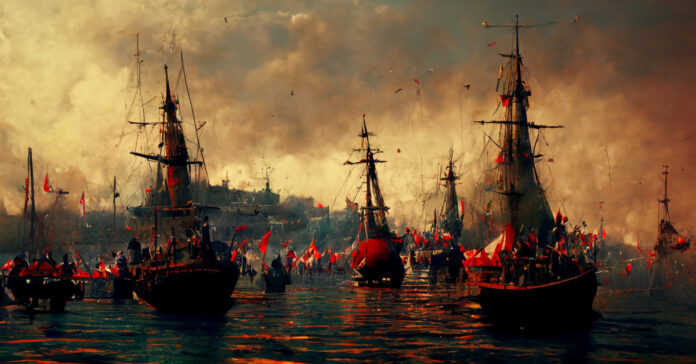While the United States is a democratic republic, it is also an empire in the historical sense of the word. Like the Roman Empire, which was founded before the birth of Christ and finally gave way to the Ottoman Empire. Or the Ottoman Empire, which controlled Northern Africa and a good chunk of Western Europe and Eastern Asia from the 13th century until early in the 20th century.
The British Empire was unlike its processors in that it spanned oceans and depended not just on armies but on navies. The British Empire had its origins in the 16th century and started to fall apart after World War II. One of their rivals was the Russian Empire, which existed from 1721 to 1917.
Throughout history, there have been many empires, and most are based on military strength and financial strength. Most empires were built on trade, which brought them great wealth, and the control or taxation of resources. It doesn’t matter if those resources were spices, salt, precious metals, people, tobacco, minerals, or computer chips. The country that controls what everyone else wants has an economic advantage.
All Empires Fall
Being an empire is like being King of the Hill; someone is always trying to knock you off. Eventually, someone succeeds.
That’s the problem with empires: they fall. While historians and educators may say the empires fail because of internal strife, I believe this is because they grow until lack the flexibility to change with the times. Like a large company being beaten by a smaller upstart, empires keep doing what they have always done, expecting it to always work, and ignoring the progress made in the world around them. Then the paradigm shifts, and another empire emerges.
Empires rarely fall quickly; they usually decay for a period of decades until one event causes the empire to collapse. Like an oak, they may drop limbs from time to time, but no one knows how far the rot has proceeded until a storm comes and the once mighty tree falls, revealing the full extent of its decay.
The decay may be the weakening of their currency, which they realize belatedly when no one wants to take their currency in return for goods. It may be their armed forces that grow weak, which is apparent when some upstart challenges them on the field of battle and makes significant progress against them. It may also end in revolution, when the populace rises up, overthrows the current regime and replaces it with what they hope will be a more palatable replacement.
I think the best way for an empire to go is slowly, much as the British Empire faded away as colony after colony declared independence. This allowed Great Britain to maintain some influence, as it does in countries like Canada and Australia.
Empires of Today
Right now, there are three empires in various stages.
- What is left of the Soviet Union is a dying empire struggling to maintain relevancy and power. Prior to the Ukrainian invasion, they were still a vital, though diminished. While a quick victory might have helped build some power and respect, the current state of affairs has demonstrated their military weakness and is lowering their standing on the world stage.
- Then we have the United States, an aging empire that appears to have peaked decades ago. Instead of taking their “peace dividend” when the Soviet Union collapsed and building the country into an unassailable global power, the U.S. wasted the opportunity and instead became fat and happy. An old-time emperor would not have allowed this to happen, but presidents who run for election every four years gave the people bread and circuses (or food stamps and cell phones) when what they really needed was the safety of a stronger military.
- Finally, we have China, an empire in the emerging stages. While China does not have the problem of a democracy, they are more likely to face a revolution, especially if they don’t get a handle on their finances. When I spoke earlier about a weak currency, you may have thought of the dollar, but it is the Yuan that is growing weaker. As bad as the United States financial position may be, China’s is worse. They also do not yet have the modern military the need to dominate.
A truly united Europe might have challenged any of the three, but the EU is far from united and appears further at odds than ever. I give it a 50-50 chance that the EU collapses before 2035.
The Outcome
I expect Russia’s days of being a super power will not return. The big question is who will fall, China or the U.S. Either is a possibility.
If China acts prematurely and invades Taiwan in the next year, I think they will fail, which will lead to regime change. If they continue to build their resources and the U.S. continues to worry more about climate change and other aspects of the woke agenda, then China could one day supplant us as the top of the food chain. At this stage, nothing is certain because the U.S. effectively has a regime change very four years and that can slow our downhill slide.
Of course, it’s also possible nuclear war could knock one or more of these candidates for empire off the map in a. Or all three could be knocked back to the Stone Age, leaving the next empire to emerge from the Southern Hemisphere.
What this Means for Preppers
There is very little individuals can do to stop the decline and fall of empires. We can vote, but it takes more than one vote to change the tide.
The important thing to remember is that the Roman Empire fell, and Rome is still there. The Russian Empire fell, and then 60 years later the Soviet Union collapsed, but Moscow is still there. Same with the British Empire, and London not only survived but is one the financial capitals of the world. Chances are, most of us we will survive anything but a global nuclear war, and some of us will survive even that.
To improve your odds of surviving the coming conflict or the collapse of an empire, stockpile food and gear. Move to a location with a low population density and a low rate of crime. Have a secure home that will keep you safe and sound even when the power is out and has room to raise some of your own food. Make sure you are equipped and prepared to protect yourself from those who are unprepared for the collapse.
Few people can prepare in a week, but then empires don’t fall overnight. It’s OK to take your time, but get started while you still can and then build your momentum.







